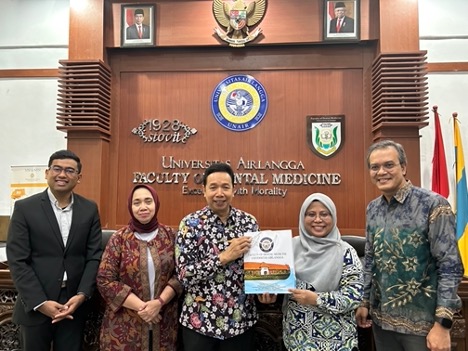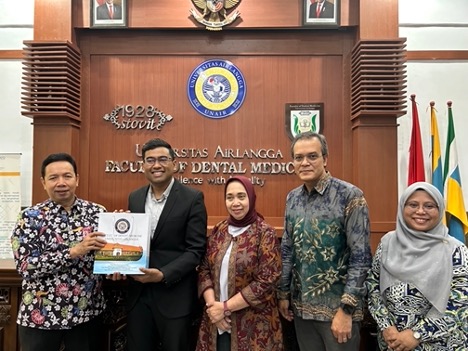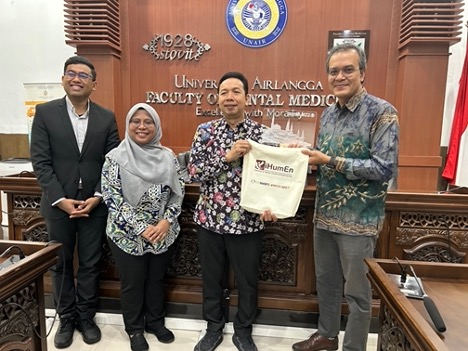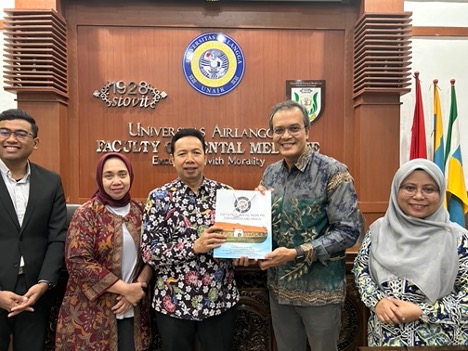On 19-20 September 2024, a significant event took place at the Faculty of Dental Medicine of Universitas Airlangga (UNAIR). The activities included a Research Strategic Meeting and a General Lecture, which led to a promising conclusion. The discussions resulted in the establishment of a research collaboration, the sharing of facilities, the initiation of a matching grant, and plans for joint publications. The research focus of this collaboration will be on biomaterials, implant development, and dental personalized implants. The expected outputs from this collaboration include book writing, joint publications, the development of new biomaterials for dental applications, and personalized implants for dental use. This partnership aims to advance research and development in these critical areas, ultimately contributing to improved dental healthcare solutions.
The implant development research specifically aims to create new biomaterials that are biocompatible and integrate well with the body’s tissues, enhancing the durability and effectiveness of dental implants. Additionally, the research seeks to develop personalized implants tailored to individual patients’ needs and incorporate innovative technologies such as artificial intelligence (AI) and augmented reality (AR) to improve the precision and outcomes of implant procedures. Through these efforts, Unair aims to make significant contributions to the field of dental implantology, providing better solutions for patients with missing teeth and other dental issues.
Universitas Airlangga (Unair) has a distinguished reputation in dental research, particularly through its Faculty of Dental Medicine. The university’s research center is equipped with state-of-the-art laboratories specializing in various fields such as immunology, molecular biology, microbiology, dental biomaterials, and stem cell research. These facilities support a wide range of diagnostic services, training, and seminars, contributing to advancements in oral health and disease prevention. Unair’s research efforts are also bolstered by the Clinical Practice & Evidence-Based Dentistry Research Group, which focuses on topics like periodontitis, hydroxyapatite, and alveolar bone regeneration. This group is involved in both basic and applied research, aiming to translate scientific discoveries into practical dental treatments and technologies. Moreover, Unair is committed to fostering international collaborations and enhancing the capabilities of its staff through continuous professional development. This dedication to excellence ensures that Unair remains at the forefront of dental research, contributing significantly to the global body of knowledge in dentistry and improving patient care through innovative solutions.



Personalized dental implants represent a significant advancement in dental care, offering tailored solutions that cater to the unique anatomical and physiological needs of individual patients. These implants are designed using advanced technologies such as genetic sequencing and 3D printing, which allow for the creation of implants that are more compatible with the patient’s body. This personalized approach can improve tissue compatibility, reduce the risk of immune reactions, and enhance the overall success rate of implant procedures. One of the key benefits of personalized dental implants is their ability to integrate seamlessly with the patient’s existing bone structure, promoting better bone regeneration and stability. This is particularly important for patients who have experienced bone loss or other complications that make traditional implants less effective. Additionally, personalized implants can be designed to match the exact size, shape, and color of the patient’s natural teeth, providing a more aesthetically pleasing and functional result. By leveraging these innovative technologies, dental professionals can offer more effective and customized treatment options, ultimately improving patient outcomes and satisfaction. This approach not only enhances the durability and functionality of dental implants but also contributes to the overall advancement of dental healthcare.
Customized dental implants have shown impressive success rates, comparable to traditional implants. Studies indicate that dental implants generally have a success rate ranging from 90% to 98% over a period of 10 years. This high success rate is attributed to several factors, including the precision of implant placement and the biocompatibility of the materials used. Personalized implants, designed using advanced technologies like genetic sequencing and 3D printing, offer even greater potential for success. These technologies allow for the creation of implants that are tailored to the unique anatomical and physiological needs of individual patients, improving tissue compatibility and reducing the risk of immune reactions. As a result, personalized implants can integrate more seamlessly with the patient’s existing bone structure, promoting better bone regeneration and stability. Moreover, the use of innovative technologies such as artificial intelligence (AI) and augmented reality (AR) in the planning and placement of these implants further enhances their precision and outcomes. With proper maintenance and regular check-ups, these implants can last a lifetime, providing durable and effective solutions for dental restoration.







==============================================
Faculty of Dental Medicine (FKG), Universitas Airlangga (UNAIR)
Medical Devices and Technology Centre (MEDiTEC) UTM
Institute of Human Centered Engineering (iHumEn) UTM
Universiti Teknologi Malaysia (UTM)


